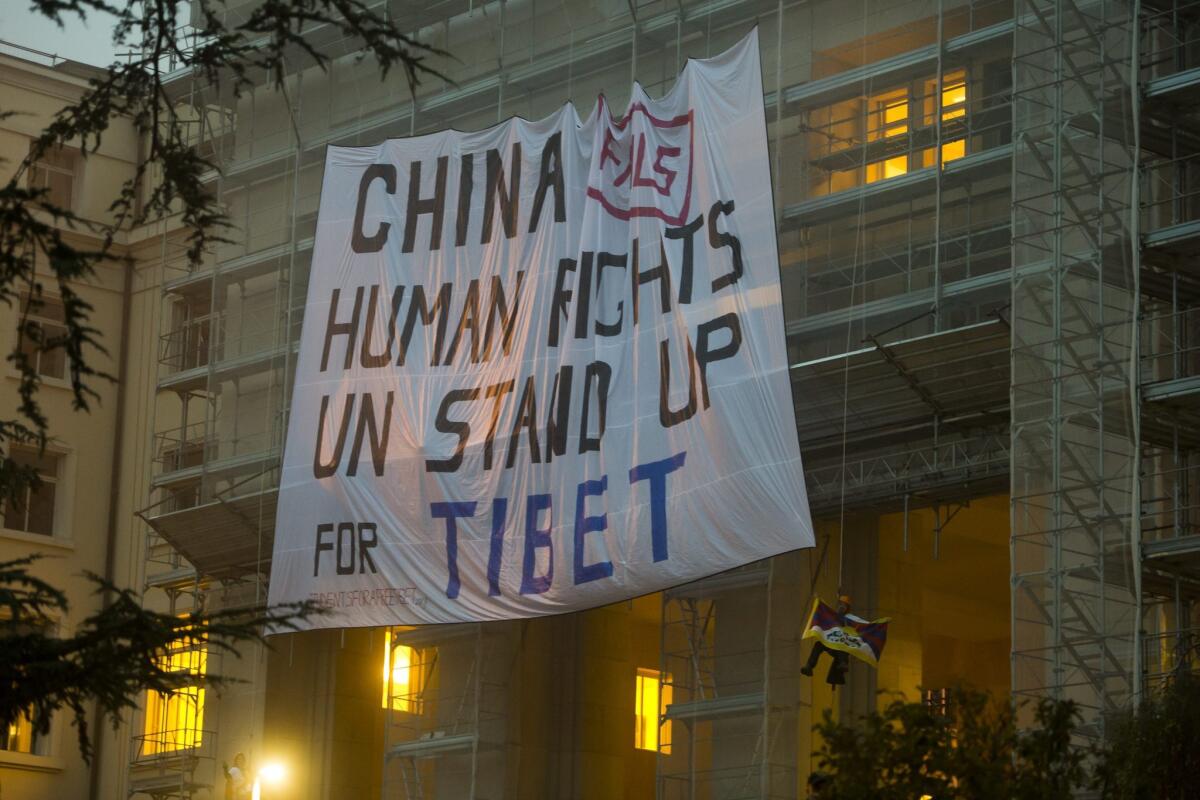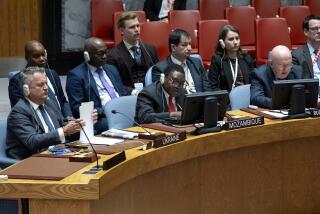UN review of China human rights record draws clashing accounts

- Share via
To hear Chinese authorities tell it, the world’s most populous country has made “giant leaps in human rights protection,” having reduced poverty, carried out judicial reforms and spread Internet access to 564 million people.
“We are soberly aware that China still faces many difficulties and challenges in promoting and protecting human rights,” special envoy Wu Hailong told the U.N. Human Rights Council in Geneva on Tuesday, while insisting that the Beijing government has made impressive progress since its last review, four years ago.
But delegates from Western democracies and human rights watchdogs had a starkly contrasting account of China’s record in ensuring individual freedoms and minority rights. They told the 47-nation council -- to which China aspires in an election next month -- that communist authorities continue to jail political dissidents, repress religious minorities and deprive Tibetans of cultural and political independence.
“We’re concerned that China suppresses freedoms of assembly, association, religion and expression,” said Uzra Zeya, a U.S. State Department official responsible for democracy, human rights and labor issues. She added that China must stop jailing rights activists and their families and cease harassment of ethnic minorities, such as the Muslim Uighurs.
Before the three-hour hearing on China’s record began, several Tibetan activists managed to scale scaffolding around the U.N. headquarters at the Palais des Nations in Genevaand unfurl a banner demanding “China human rights - UN stand up on Tibet,” news agencies reported.
In Beijing, the government released a white paper on Tibet, saying, “Growth and progress could not have been achieved without the correct choice of a development path” by the Beijing leadership. It also disparaged Tibet’s exiled spiritual leader, the Dalai Lama, as leader of a “clique” fomenting separatist activity in the Himalayan region.
International rights activists denounced Wu’s presentation of China’s record. Jianli Yang, president of the opposition group Initiatives for China, called the government’s version of the situation in China “blatant lies.” In a webcast news conference that followed the review hearing, he called on democracies in the U.N. General Assembly to vote against China’s bid for a seat on the Human Rights Council when new members are elected on Nov. 12.
“In the four years since the last review, the Chinese government has failed to substantially improve its human rights conditions,” said Iona Liddell, executive director of the Tibet Justice Center, speaking at the Geneva news conference. She said conditions in Tibet “continue on a rapid, downward spiral.”
Julie de Rivero, Geneva director of Human Rights Watch, said she was pleased to hear so many delegates express concern about China’s treatment of activists and political opponents, and about what they consider excessive use of the death penalty.
Bolstering Wu’s account of human rights protection, Global Times, an English-language edition of the official Communist Party People’s Daily, offered a glowing report claiming major advances.
“An overwhelming majority of countries commended China’s significant progress in human rights protection,” the news commentary stated, referring to council member countries Cuba, Russia and Venezuela that praised their leftist ally. “The efforts by the Chinese government and people to promote and protect human rights have been well recognized by the international community.”
Applying the Chinese proverb that “a journey of a thousand miles begins with one step,” the party news source ticked off what it said were giant leaps in promoting and protecting human rights: abolishment of the death penalty for 13 nonviolent economic crimes, direct elections for rural village committees, a social security system to ease Chinese workers’ worry about their economic future and a $585-billion stimulus package that has created jobs and boosted the economy.
In its petition filed in June for a seat on the Human Rights Council, Beijing asserted, “The Chinese government respects the principle of the universality of human rights and has made unremitting efforts for the promotion and protection of the human rights and fundamental freedoms of the Chinese people. China earnestly fulfills its obligations under relevant international human rights treaties.”
Hillel Neuer, executive director of Geneva-based U.N. Watch, an independent monitor of United Nations actions, called the nominating testimony “a complete lie” and urged other U.N. states to prevent China from gaining a seat on the council.
Though lacking any enforcement powers, the Human Rights Council members set the body’s agenda and can “stack” testimony in their favor, Neuer noted, pointing to what he sees as a “mutual praise society” where one rights abuser calls on another to attest to a fictive record.
ALSO:Irish authorities take custody of blond girl living with Roma
Egypt orders arrests of police in Muslim Brotherhood deaths
Reports: U.S. drone strikes in Yemen, Pakistan killed civilians
Twitter: @cjwilliamslat
More to Read
Sign up for Essential California
The most important California stories and recommendations in your inbox every morning.
You may occasionally receive promotional content from the Los Angeles Times.











